


Photo by James and Karla Murray, as seen in the book Store Front: The Disappearing Face of New York
The coronavirus pandemic is impacting the world like never before. New York City’s restaurants and bars have taken an astronomical hit as the city, nation and the world faces the impacts of COVID-19. Small businesses had to quickly adapt to a takeout and delivery model, with little guidance or financial stability. The federal Paycheck Protection Program loans were more difficult for restaurants and bars to obtain, as the business model relies more on part-time employees than full-time employees on payroll, which the loan program is geared toward.
With Mayor de Blasio anticipating that restaurants will only be able to open up to 50% capacity by Labor Day, the strain on the city’s local restaurants and bars may become too much to bear. Already, more than a dozen eateries have shut their doors permanently or have announced plans to relocate due to economic stress and high utility costs. Here is our guide to the restaurants and bars that have closed in New York City already, from oldest to newest.
1. The Paris Cafe (Founded 1873)
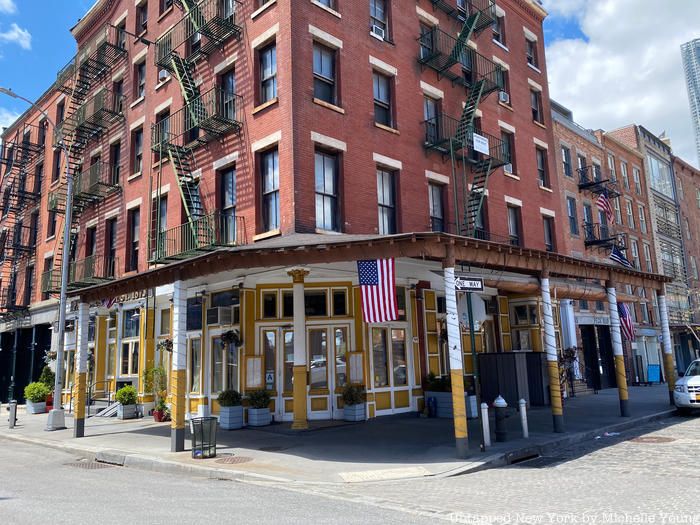
Located in the Historic South Street Seaport, The Paris Cafe announced in early May that it would be closing its doors for the forseeable future. Opened in 1873, the cafe was one of New York’s oldest pubs, and it served a menu of traditional Irish and American rustic fare with an emphasis on seafood. The restaurant also claims to have served famous patrons like Theodore Roosevelt and Buffalo Bill Cody. With views of the Brooklyn Bridge and with 12 big screen televisions, The Paris Cafe was a destination for city-dwellers looking for a delicious dinner or a late night beer (until 4:00 a.m.).
The pub was originally a part of Meyers Hotel and Bar back when the area had a busy port and seafood scene. Although it could not survive the coronavirus, the pub did survive Hurricane Sandy, which flooded the eatery to its ceiling after its front doors were blown away. The pub opened seven months later after extreme repairs and went back to serving popular dishes like Paris Mixed Seafood Chowder and Irish Shepherd’s Pie. The Paris Cafe was also well-known for its seafood selections like fish & chips and seafood stew in a tomato broth.
“Through no fault of anyone but the outbreak of this virus we are unable to forge a way forward that makes economic sense,” owner Pete O’Connell wrote on Facebook. “We had no option but to close our doors. Hope springs eternal and perhaps with a change in the economic climate we may find our way back.”
2. Gem Spa (Founded in 1922)

Photo by James and Karla Murray, as seen in the book Store Front: The Disappearing Face of New York
In early May, we were saddened to hear of the permanent closing of Gem Spa, a century-old beloved East Village haunt for egg creams that was located on the corner of St. Mark’s Place and Second Avenue. The corner store first opened in 1922 under a different name and became Gem Spa in 1957.
Gem Spa was one of the locations on our Historic East Village Food Tour, led by renown photographers James and Karla Murray who are long-time residents of the neighborhood. Guests tasted delicious specialties from at least 6 different tasting stops, including Gem Spa, where they sampled the egg cream, said to have been invented in this shop in the 1920s. Earlier this week, the iconic yellow signage awning and black and yellow signage have been taken down.
3. Irish Cottage (Founded 1960)
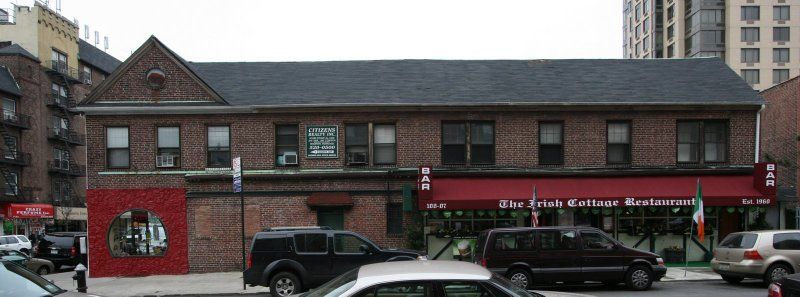 Photo Courtesy Michael Perlman
Photo Courtesy Michael Perlman
In Forest Hills, Irish Cottage at 108-07 72nd Avenue opened in 1960 and was run by the McNulty family. More than just a pub, the food was a draw, with QNS reporting in 2010 that the fare offered “Great Irish dishes done superbly.” The proprietor, Kathy McNulty died due to complications from COVID-19 in April. and her sons decided not to re-open.
Son Danny McNulty told the Sunnyside Post, “It’s very sad, we were one of the oldest family-run Irish bars in Queens.” It was one of the many locations that have found the takeout business unviable financially, and fear that occupancy restrictions in the future will also make the business difficult to operate sustainably.
Michael Perlman, Chair of the Rego-Forest Preservation Council us, “It is a sad chapter in Forest Hills and Rego Park history that these longtime community institutions that become part of New York City’s history and diverse fabric have shuttered due to the pandemic. These are the true places where memories are born, and they have offered much character and personalization for generations. I am hoping that I can find a party of interest who will preserve the ambiance and offer a similar menu.” Perlman says the wooden bar and operational fireplace is remaining in place.
4. Lucky Strike (opened 1989)
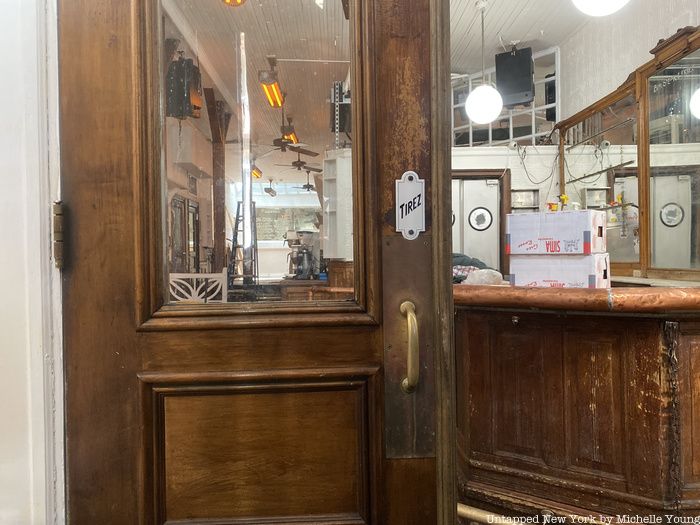
The French bistro Lucky Strike was opened in 1989 at 59 Grand Street in Soho by Keith McNally and Edward Youkilis. McNally is more well-known for restaurants like the Minetta Tavern, Balthazar, Schiller’s and more. In mid-April, it was announced that it would be open no more.
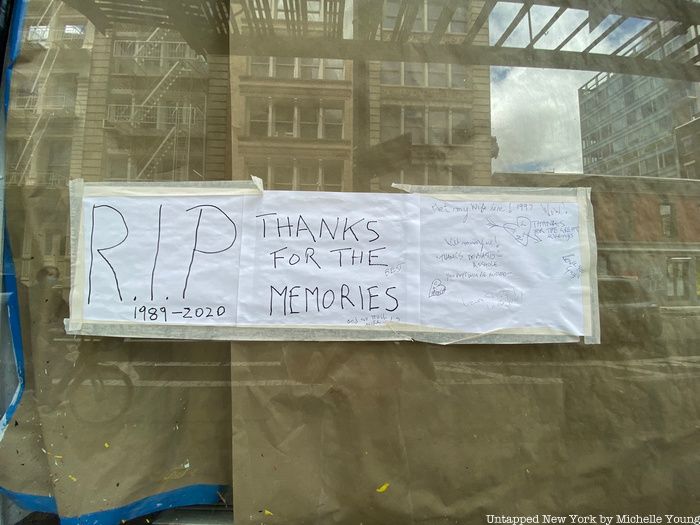
A tribute on the front window reads “RIP 1989-2020. Thanks for the Memories.” People left notes, like “Met my wife here! 1997” and “We’ll Miss You.”
5. Gotham Bar & Grill (Founded 1984)
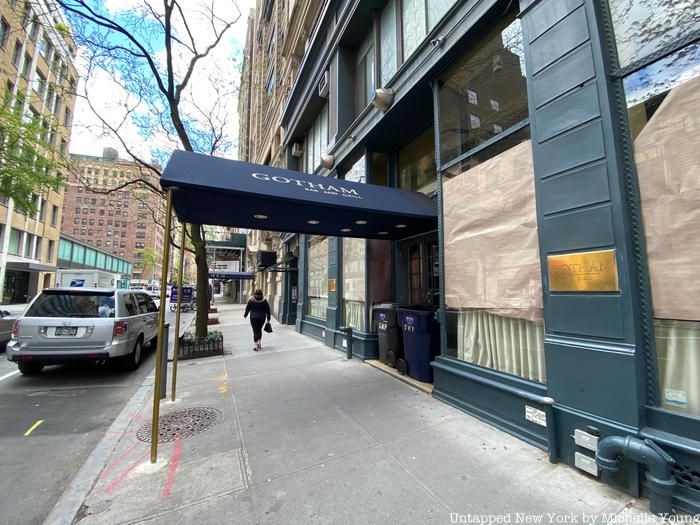
A very popular New American restaurant with a Michelin star, Gotham Bar & Grill closed on March 14 just as the coronavirus began to take a toll on New York City. Opened in 1984 in Greenwich Village, the restaurant became a fine dining legend under chef Alfred Portale. Located in the site of a former warehouse, the restaurant boasted floor-to-ceiling windows and high ceilings and even featured its own art collection. In 2019, Victoria Blamey took over as head chef after Portale opened his first solo restaurant, Portale, in Chelsea. According to Eater, many staff were intensely loyal to Portale, who pioneered a number of iconic dishes like his take on tuna tartare.
After rather sudden news that Gotham would be clothing due to heightened coronavirus measures, customers flocked to the restaurant on its final service for free high-end wines and burgers. The restaurant was known for its fine dining fare, with dishes ranging from Baywater sweet oysters to tilefish to braised rabbit leg. Blamey introduced new dishes like a yellowtail crudo with smoked avocado and Iberico pork cheek with ceci neri and black vinegar pickled pearl onion.
A statement from the restaurant notes, “We have been forced to make the very difficult decision to close the Gotham after 36 wonderful years because the unforeseen situation created by the coronavirus has made operation of the restaurant untenable.”
6. Coogan’s (Founded in 1985)
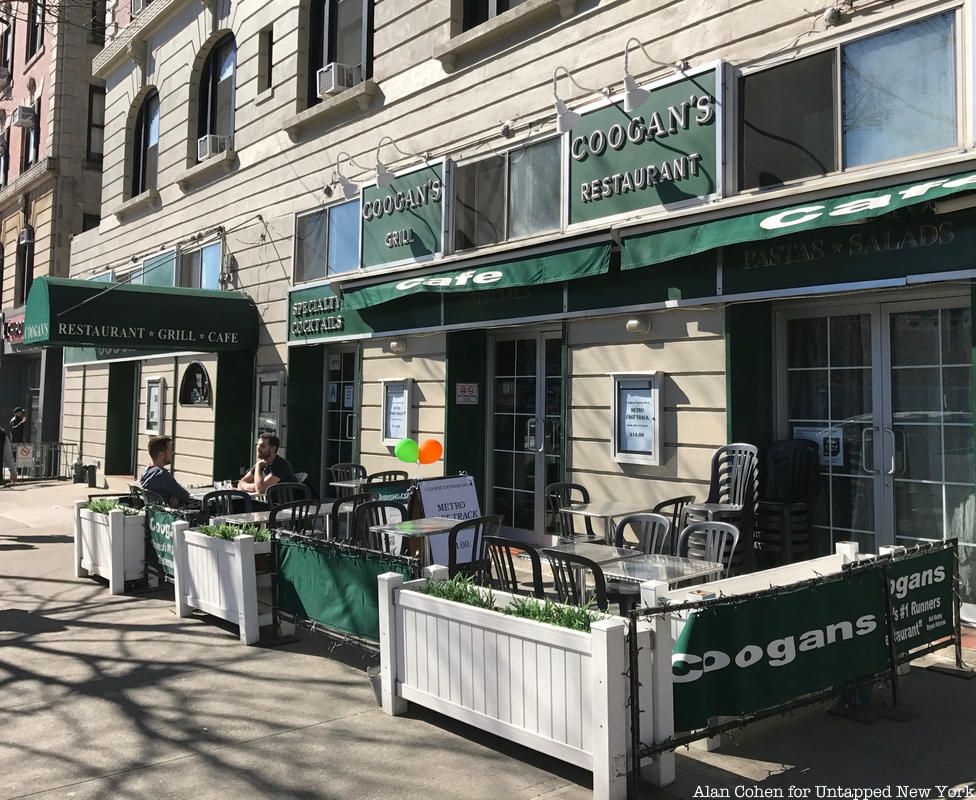
Founded in 1985, in the darkest days of the crack epidemic, Coogan’s played a pivotal role in establishing a shared sense of community necessary to turn the Washington Heights neighborhood around. Robert W. Snyder in the book Crossing Broadway, a detailed look at the recent history of Washington Heights and the richness of its immigrant community, wrote of Coogan’s: “They claimed the corner of 169th and Broadway and then, instead of defending it against all comers, invited in the whole world. . . . [It was] very Irish and very inclusive. Whoever you were, you could find a place at the bar, a table for dinner, and a picture on the wall that reminded you of someone you knew.”
Located at 4015 Broadway next to Columbia-Presbyterian Hospital and the 168th Street A, C, and 1 subway stops, you were likely to dine or enjoy an after-work beer next to a doctor, an aspiring actor, an MTA employee, or a hospital visitor. In 2018, the actor Lin Manuel-Miranda helped the bar stave off a $40,000 rent increase by spurring New Yorkers to action — more than 15,000 people signed a petition to save the restaurant. Manuel-Miranda’s forthcoming film In the Heights, set in Washington Heights was originally slated to open this summer but has been delayed a year due to coronavirus.
One month after closing down temporarily due to to the coronavirus pandemic, beloved Washington Heights haunt Coogan’s closed down permanently. Owners Dave Hunt, Tess McDade and Peter Walsh wrote, “To all our Coogan’s family that extends from a corner in New York’s Washington Heights to so many in near and distant places, we offer love and best wishes that remain safe, strong and healthy for now and ever.”
7. Aquagrill (Founded 1996)
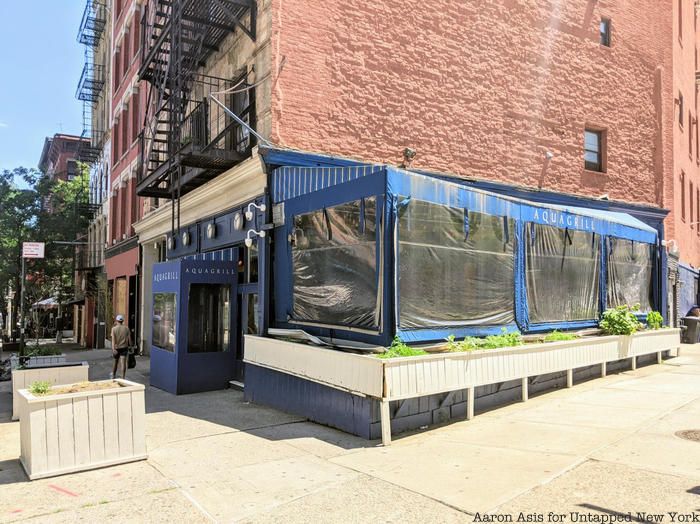
One of the city’s top seafood restaurants, Aquagrill in SoHo recently shut its doors permanently after 24 years. Opened in 1996 by Jeremy and Jennifer Marshall, Aquagrill was known for its 25 oyster varieties and other delicacies. The restaurant decided to close temporarily to COVID-19, yet last week Aquagrill shut its door permanently. Zagat considered the Aquagrill one of the top 50 restaurants, while OpenTable put it in the Top 100 in America.
Aquagrill was well-known for starters like Billi Bi French Mussel Soup with saffron, Roasted Peekytoe Crab Cake Napoleon, and Peppered Tuna Carpaccio. Among exotic seafood were selections like European Osetra Caviar and Chilled Fresh Maine Jonah Crab Claws. Popular entrees included Bouillabaisse with poached cod, mussels, and scallops, Mushroom Truffle Crusted Casco Bay Cod, and Seared Diver Sea Scallops.
8. Daddy-O (Founded 1999)
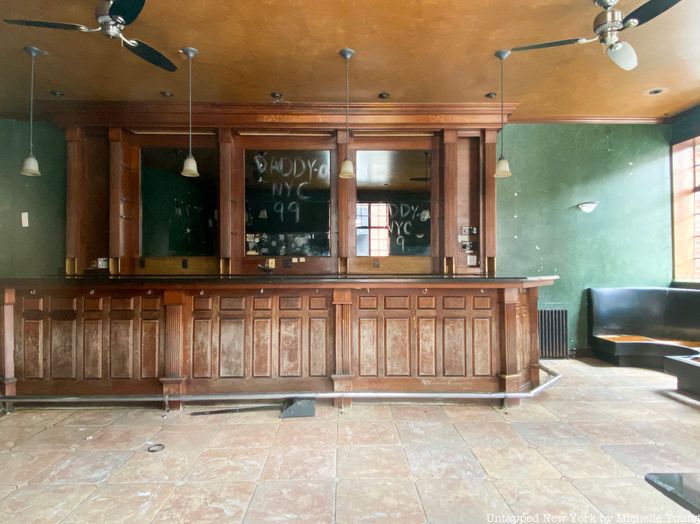
A West Village favorite, Daddy-O is a restaurant/bar that needs no introduction. Popular with both locals and tourists alike, the restaurant has prided itself on its fantastic American food and drinks and nearly perfect five-star ratings from over the years. However, amid the Coronavirus, the hotspot has closed for good.
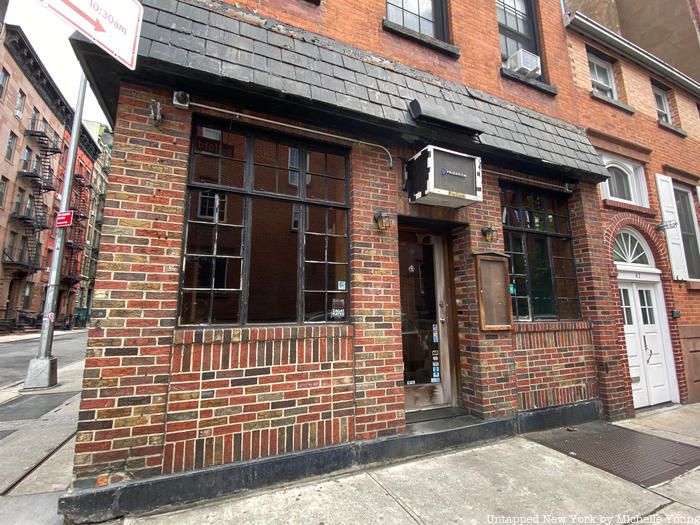
After serving for two decades, owner Phil Casaceli confirmed that the eatery was now to be closed on a permanent basis and will not be reopening after the coronavirus lockdown procedures have been lifted. The official closing date was April 30th, although no official details have been released as to why.
9. Beyoglu (20+ Years in Business)
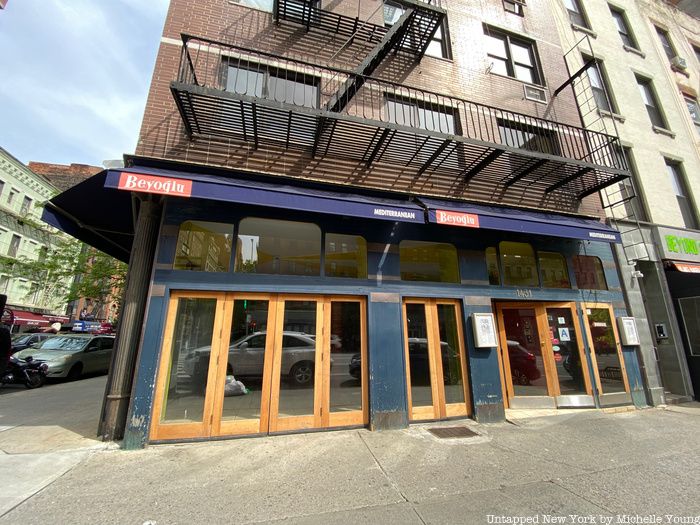
Beyoglu, a Turkish restaurant on the Upper East Side, shut its doors last week after more than two decades in the neighborhood. As a result of COVID-19, Beyoglu’s owners faced a massive financial hit and were unable to extend their lease. The Third Avenue establishment often featured outdoor seating around the corner, despite being “rushed”, “cramped” and “loud” according to Zagat.
Beyoglu was known for classic Mediterranean and Turkish starters like hummus, Taboule, and Barbunya Pilaki, red kidney beans, with potatoes and carrots. Popular meze, or appetizers, included Sucuk Izgara, cumin and garlic spiced cured beef, and Ahtapot Salatasi, char-grilled marinated octopus. Main dishes ranged from lamb Doner Kebab with rice to Kilic Sis, char-grilled swordfish kebab.
10. Jewel Bako (Opened 2001)
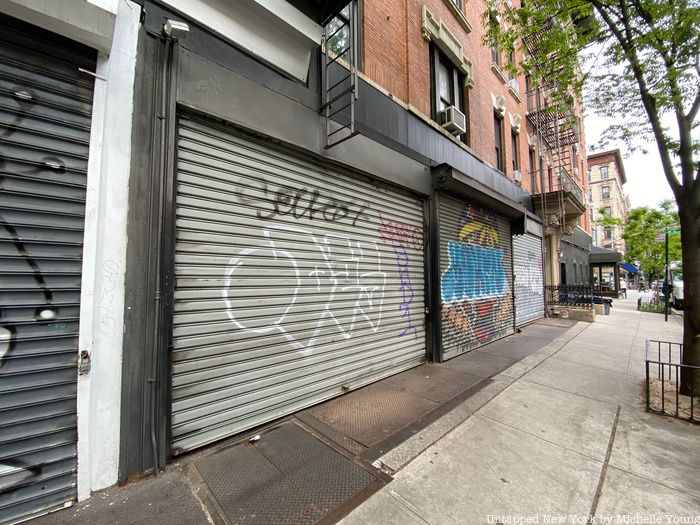
Jewel Bako and Restaurant Ukiyo, next door neighbors in the East Village, both shut down recently despite rave reviews from those in the community. With one Michelin star, Jewel Bako was a high-quality Japanese eatery that specialized in omakase, a chef’s tasting menu of a variety of sushi, sashimi, and other small Japanese bites. According to Michelin, Jewel Bako had much of its fish flown in directly from Japan, leading to popular dishes like pearly cod fillet.
Owners Jack and Grace Lamb’s transformed their chef’s counter restaurant Degustation into Restaurant Ukiyo, a French eatery with Japanese and other international influences. Dutch chef Marco Prins led the kitchen and created popular dishes like “parfait of foie gras” with crispy rice and halibut with dashi hollandaise. Ukiyo, which opened in 2018, was a very intimate restaurant, with just 18 seats at the counter, but its dishes were top-notch, with five and eight course menus.
“After almost 20 wonderful years, Jewel Bako and Restaurant Ukiyo are closing. Thank you to all our fantastic neighbors and all of the lovely friends we’ve made over these two decades! We cannot express how much we will miss you and truly thank you for making each night of service so memorable.”
11. Gimme Coffee (Opened in NYC in 2003)
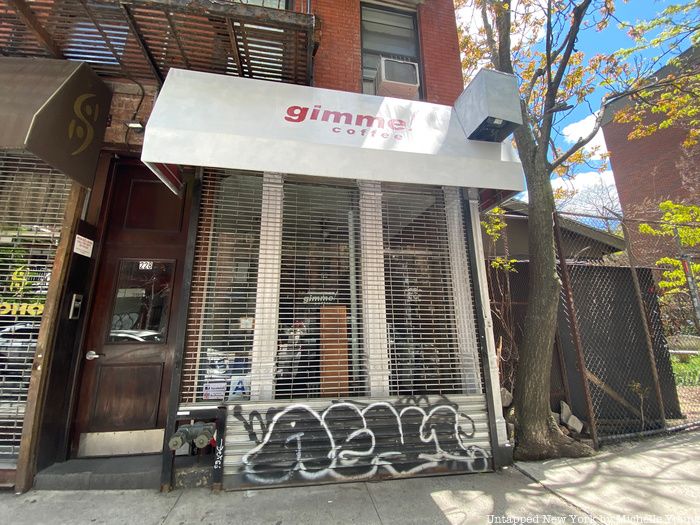
Gimme Coffee, an Ithaca-based coffee chain with two New York City locations, announced the closure of both locations on April 7 after experiencing economic hardships facing many small businesses. With locations in Williamsburg, which opened in 2003, and Nolita, which opened in 2008, Gimme Coffee was a staple in New York’s up-and-coming hipster and indie communities, famous for its espressos and unique blends. Gimme Coffee is still shipping coffee beans, clothes, and even coloring pages from their Ithaca headquarters.
The coffee chain notes that many of its former baristas have started their successful coffee careers at Gimme Coffee, while others have went on to fruitful art and music careers. Gimme Coffee is still supporting its NYC staff through sales of its Rally blend, and both shops currently have virtual tip jars on Venmo. Although the future is uncertain, Gimme Coffee hopes to reopen at least one store in NYC soon, but for now, both locations will remain shut and regulars will have to find a new go-to place for espressos.
“We wish we had the opportunity to say goodbye in person and are left with a collective hole in our hearts for not having had the ability to have done so,” they wrote on Instagram.
12. Woodhaven House (Opened 2004)
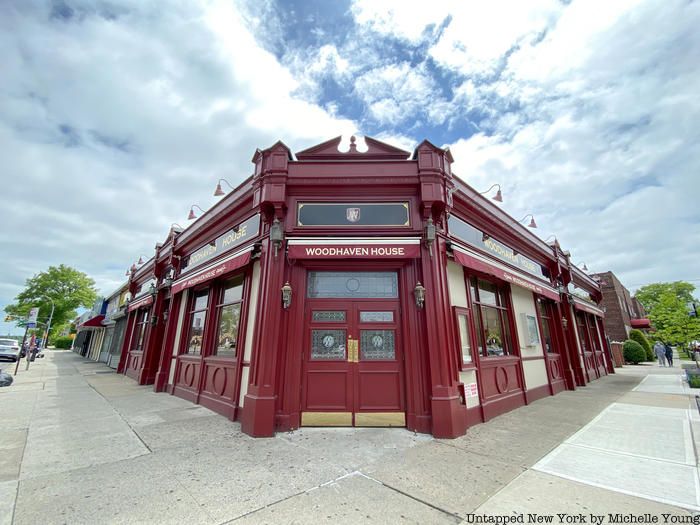
Woodhaven House, a pub located on a corner at 63-98 Woodhaven Boulevard, opened in 2004. Owner did a complete renovation of the restaurant, which features wooden banquettes, and an impressive wood bar with large mirrors. In early May, the restaurant announced via Facebook that it would not reopen. “It is not financially possible to continue. These last few months have been devastating for us all in so many ways. Family members and friends lost, so much economic hardship suffered.”
Many long-time customers left dedications on the post, with words like “The Woodhaven House will ALWAYS hold a cherished place in my heart” and “Our family have been regulars since 1983. When John Cregan took over I had my retirement party at Woodhaven House.”
13. Pegu Club (Opened 2005)
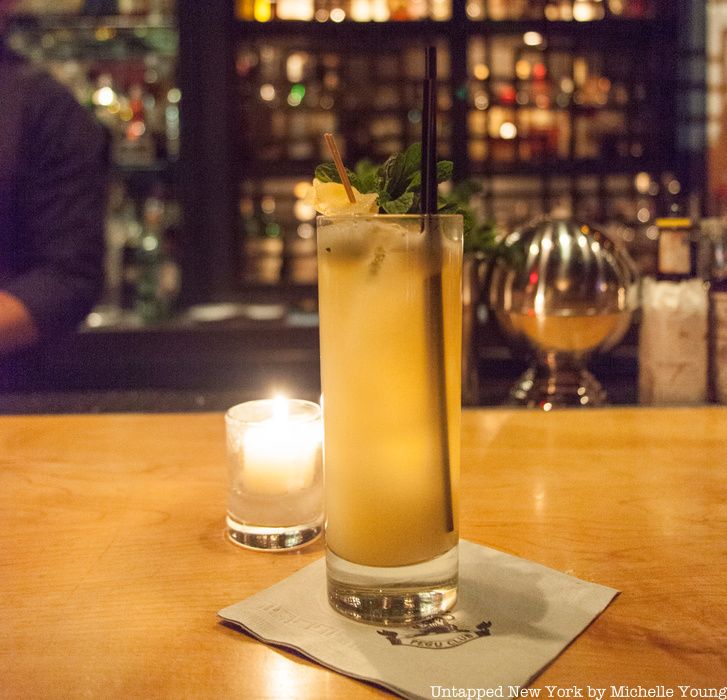
Pegu Club, a world-famous SoHo craft cocktail bar, has shut its doors permanently, just months before its 15th anniversary. Owned by Audrey Saunders, one of the best-known bartenders in the country, Pegu Club opened in 2005 and served a variety of carefully constructed drinks, such as their namesake cocktail with gin, lime, Orange Curacao, Angostura, and orange bitters. Other popular drinks included their Earl Grey MarTEAni with Earl Grey-infused gin, lemon, and raw egg whites, their Jamaican Firefly with dark rum and ginger beer, and Cucumber-Mint Creole.
Saunders, who previously worked at places like Blackbird, Beacon, and Bemelmans Bar, crafted a cocktail menu using products then unavailable in New York, like Rittenhouse rye whiskey, creating her own drinks like the Gin-Gin Mule. Pegu Club also offered a number of high-quality small plates like smoked trout deviled eggs, crispy squid, and sloppy duck served in tropical fruit barbecue sauce. The dimly lit bar on the second floor of a Houston Street building was known for its bamboo floors, comfortable leather chairs, and rather loud atmosphere.
“Our lease was due to expire on October 31st, and we had every intention of staying put until then,” Saunders wrote in a letter. “We were also looking forward to celebrating our 15th anniversary on August 29th in a grand way. But Covid-19 has taken every bit of the life we had out of us, and a soft reopening following NYC guidelines would not be enough to sustain us entering into the summer months — historically, Pegu’s summer business has been as slow as molasses.”
14. Momofuku Ssäm Bar (Opened 2006)
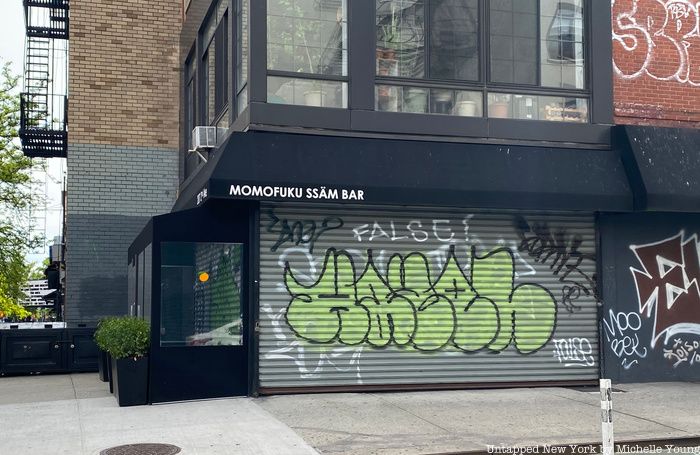
Momofuku Ssäm Bar, a restaurant that forever changed the East Village dining scene, is closing and relocating to Momofuku’s Bar Wayō, located in Manhattan’s Seaport District. Established by chef David Chang, Momofuku has seven restaurants in New York City and seven more across the globe. Opened in 2006, Ssäm Bar sold Korean-style burrito wraps, but it son grew into a casual Asian-inspired brasserie at fairly affordable prices. The restaurant helped popularize Korean fare across the city and attracted tourists and locals alike.
Ssäm Bar became popular for its Asian-inspired American dishes like Spicy Pork Sausage & Rice Cakes, Wagyu Beef Tartare, and Banana Leaf Roasted Skate. With separate lunch, dinner, and brunch menus, Ssäm Bar offered a large variety of creative dishes using fresh ingredients like Broadbent ham from Kuttawa, Kentucky and uni from Maine.
Bar Wayō, Ssäm Bar’s new location, features a smaller menu accompanied by seasonal cocktails, beer, and wine. Dishes range from Curry Donuts to Smoked Brisket Sandwich to 12oz Ribeye. Although Ssäm Bar’s new location in the Seaport District will offer diners with a new view and perhaps a different dining experience, the move is also detrimental to the East Village, according to a recent Eater article.
“Ssäm Bar felt like an anchor tenant in slowing that neighborhood’s transition,” author Ryan Sutton wrote. “And now it’ll be another empty storefront in a slice of the city that’ll have no shortage of empty storefronts as the pandemic forces more businesses to close.”
15. Takashi (Opened 2010)
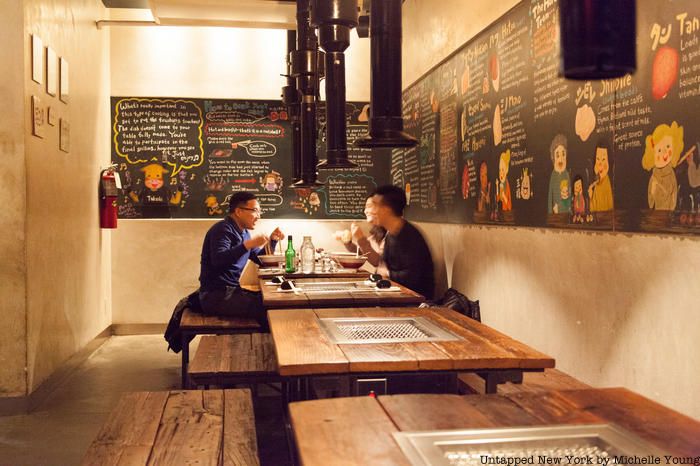
We were also very sad to hear about the permanent closing of Takashi, the Korean barbeque joint in the West Village serving up all things beef. In the restaurant’s own description, “Our menu is beef, all beef, and nothing but beef!”. We had included this restaurant in our book New York Hidden Bars & Restaurants for its late night ramen evenings, after hours which were by reservation only. You’d see the 34-seat restaurant packed beyond a “Sorry We’re Closed” sign. A decadent beef broth ramen would be served, in broth made over the course of 24 hours by simmering beef bones with garlic, ginger, and herbs.
Takashi was created by Chef Takashi Inoue, who sadly passed away in 2017 at the age of 40 from a respiratory illness, and Saheem Ali. Inoue was born in Japan to third-generation Korean immigrants, and his cuisine was a blend of both cultures. Ali kept the restaurant going after Takashi’s death as a tribute to his mission but tells Eater that the restaurant won’t survive the coronavirus pandemic.
16. Glady’s (Opened 2013)
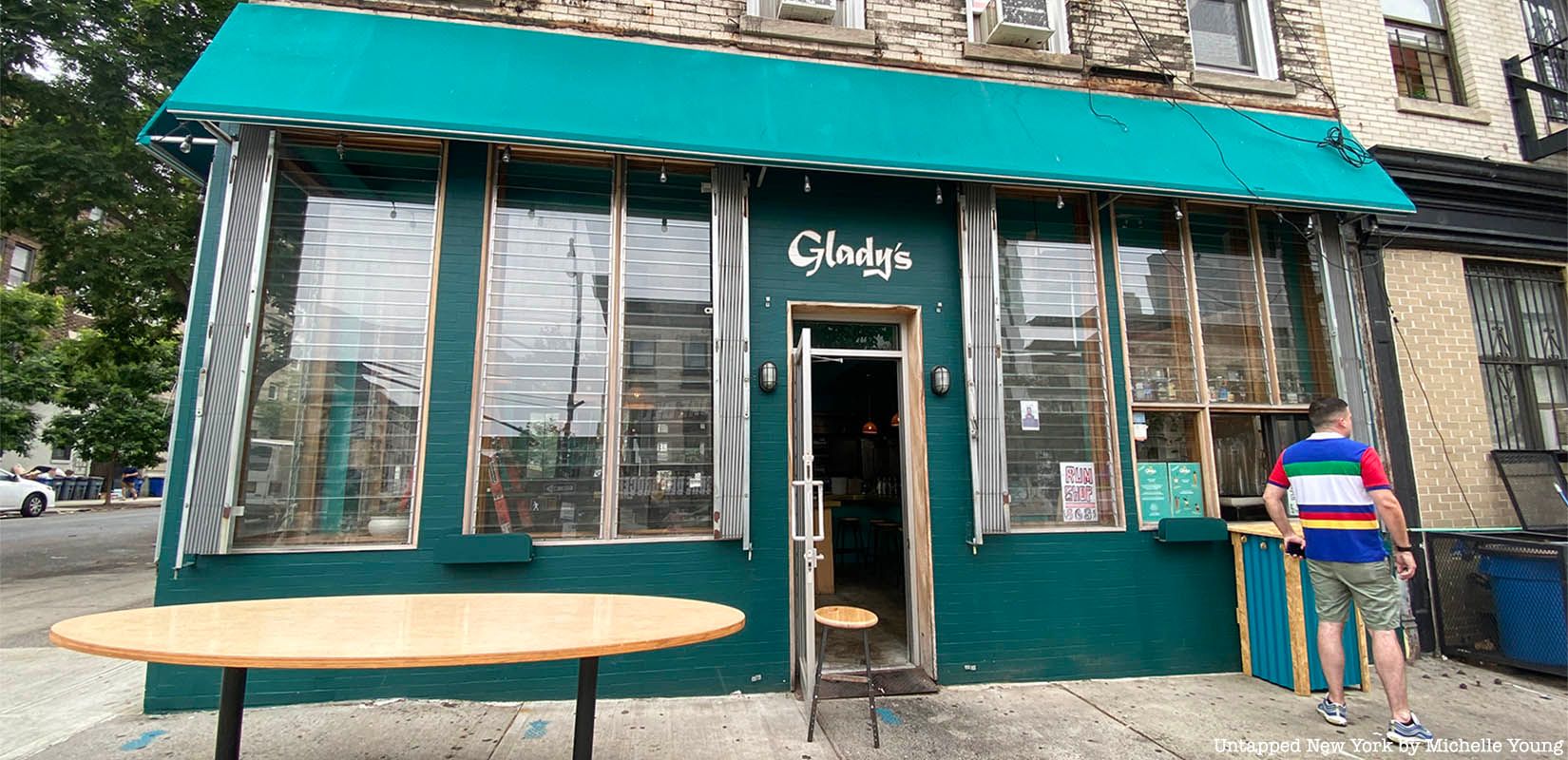
Glady’s, the popular Caribbean eatery in Crown Heights, has announced that has closed permanently as a result of COVID-19, the latest restaurant and bar casualty in New York City due to the pandemic. Starting off as a sandwich shop by owner Michael Jacober, Glady’s transitioned to a Jamaican eatery inspired by Crown Heights’ demographics.
“Unfortunately, due to the financial stress of Covid-19 and failed negotiations with our landlord Glady’s will be closing indefinitely after service on Sunday, June 28th…” Glady’s wrote on Instagram. “It has been a pleasure to serve the Franklin Avenue community these last 7 years.” We photographed the restaurant on Saturday, when it was still serving take out through the front window. Although Glady’s Crown Heights location is now closed, sister restaurant Mo’s Original and sister bar Any Thing remain open.
17. Toro NYC (Opened 2013)
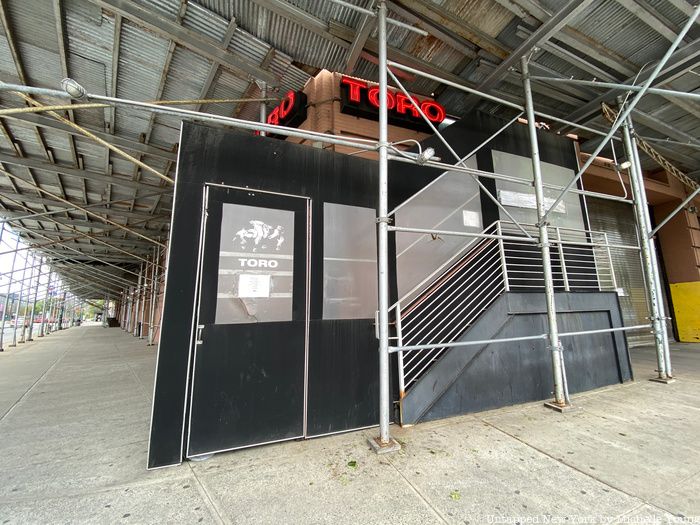
Toro NYC, a tapas restaurant in Chelsea, shut its doors on March 15. The eatery opened in 2013 as an expansion of the original Toro in Boston, owned by award-winning JK Food Group. With 30-foot ceilings and around 125 seats, Toro NYC was about twice the size of its Boston location and featured a large menu of over 60 dishes. Chefs Jamie Bissonnette and Ken Oringer also own Toro Dubai and were recently named as finalists for a 2020 James Beard award for Outstanding Restauranteur.
Toro NYC was known for its tapas, small Spanish appetizers or snacks, ranging from Erizos Con Caviar with quail egg and uni, salt cod croquettes, and pork belly with apple and rutabaga. The restaurant was also known for its paella with langostino, or “little lobster.”
“Many thousands of workers are unexpectedly unemployed with little to no way to provide for themselves and their families,” the restaurant wrote on their Instagram. “Toro NYC has come to then end of our journey, and the staff will not have a restaurant home to come back to when this pandemic ends. This is a sad sad time. Staying positive will keep the energy up.”
18. Cherry Point (Opened 2016)
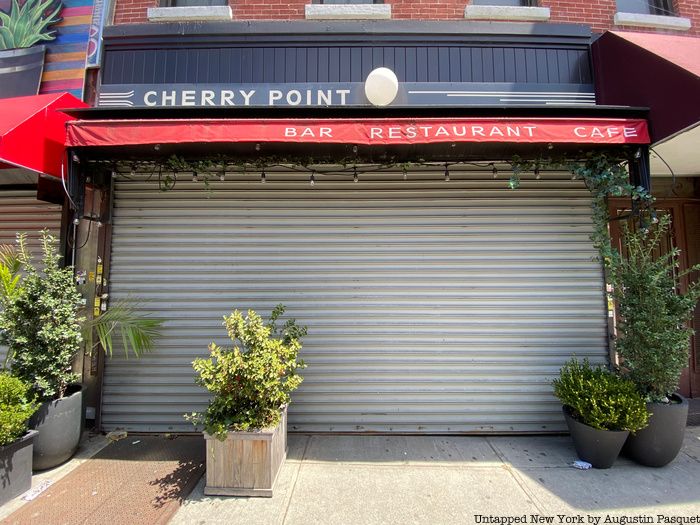
In March, Cherry Point, an English-inspired farm-to-table bistro, shut its doors to the Greenpoint community. A rather classy eatery, Cherry Point opened in May 2016 in a former Polish butcher shop. The independent restaurant was run by owner Vince Mazeau and featured a meat and cheese-heavy menu of classic American and English fare.
The menu featured a number of cheese and charcuterie options as well as a selection of starters like burrata and steak tartare. Among entrees were its double patty burger with pickles and peppers, steak frites with a steak butchered in house, and pan-seared young chicken. Although the eatery has closed its doors, it launched a relief fund in which proceeds will be evenly split among employees, and within just a few weeks the restaurant raised $10,000.
“One of the greatest challenges of my life is to have opened my first restaurant and the greatest joy is to have meet the many indefatigable individuals in the industry …. and now, a devastating collective experience takes us all down,” the eatery wrote on Instagram. “Cherry Point and countless other restaurants are out of business for the foreseeable future. We were fortunate to have met so many extraordinarily warm, unique, creative, cool, and wonderfully spirited and generous neighbors in Greenpoint, Brooklyn and all the more so our staff … they took it up to 11.”
19. Nix (Opened 2016)
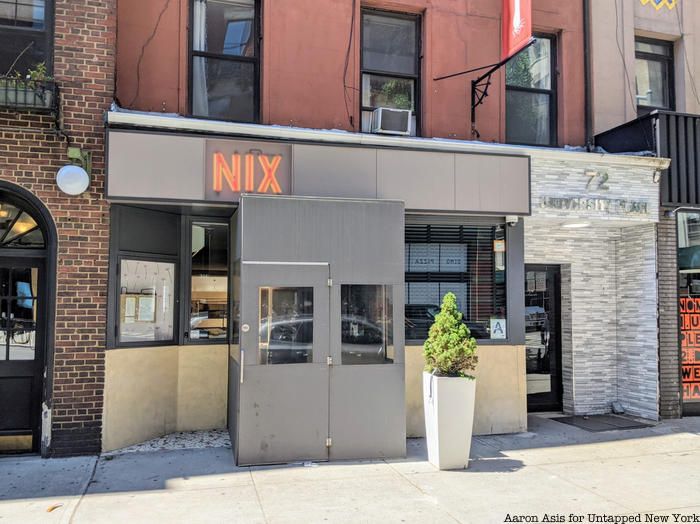
The Michelin-starred vegetarian restaurant Nix announced on June 10th that it would be permanently closing. The Greenwich Village eatery was co-owned by chef John Fraser and Conde Nast editorial director James Truman. Fraser also owned the now-closed fine dining restaurant Dovetail on the Upper West Side and owns North Fork Table & Inn in Southold. Nix closed due to the declining economic conditions surrounding COVID-19.
Nix was known for its diverse selection of vegetarian dishes pulling from countries around the world, from Mediterranean hummus and labneh with Indian papadum to sauteed mushrooms in Hong Kong-style XO sauce. Smaller plates ranged from Tandoor-roasted beet salad with tamarind to tofu-skin pockets with sweet potato to Kabocha squash dumplings. Their “bolder” plates consisted of fairly pricey options like cauliflower tempura with steamed buns, Shiitake “cacio e pepe”, and Garnett yam massaman curry with lily bulb and jackfruit.
“We were four years old, almost to the day, when Covid obligated us to close,” Nix wrote on their Facebook page. “Everything that’s happened since has shown us that there is no path back to where we had been: an intimate, busy restaurant that was able to pay its staff fairly, serve its neighborhood, maintain exacting standards of excellence, and still operate as a (more-or-less) sustainable business. If we could ever achieve that again, it will not be this year. Or next. And, in downtown Manhattan, maybe not for a good while.”
20. PokéSpot (Opened 2016)
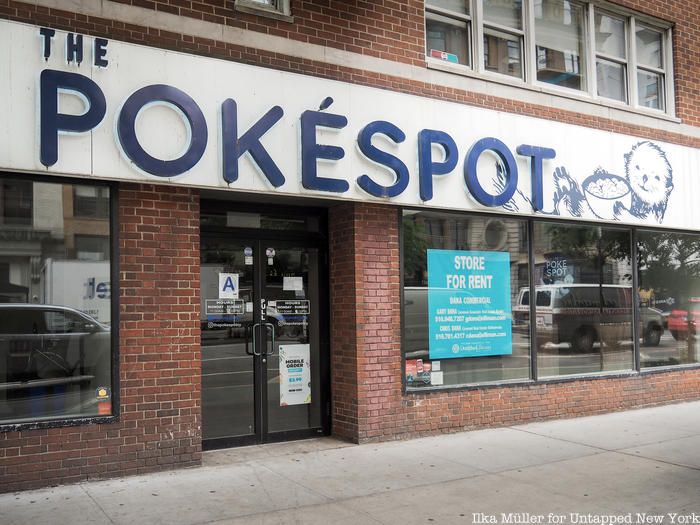
Union Square poké eatery PokéSpot has closed after nearly four years on the corner of Fourth Avenue and 12th Street. A large blue for rent sign sits in the front window, and the eatery is likely another casualty of COVID-19, as it has been closed since the start of PAUSE in March. The eatery opened in the summer of 2016, yet Manhattan’s poké scene has become increasingly competitive over the last few years as poké places have opened all throughout lower Manhattan.
The rather modern spot was known for options like their garlic ahi tuna bowl, sweet chili salmon bowl, and ceviche bowl with shrimp and snow crab. The eatery also had build-your-own poké with options like kani salad, seaweed, and togarashi spice mix.
21. Randall’s Barbeque (Founded 2018)
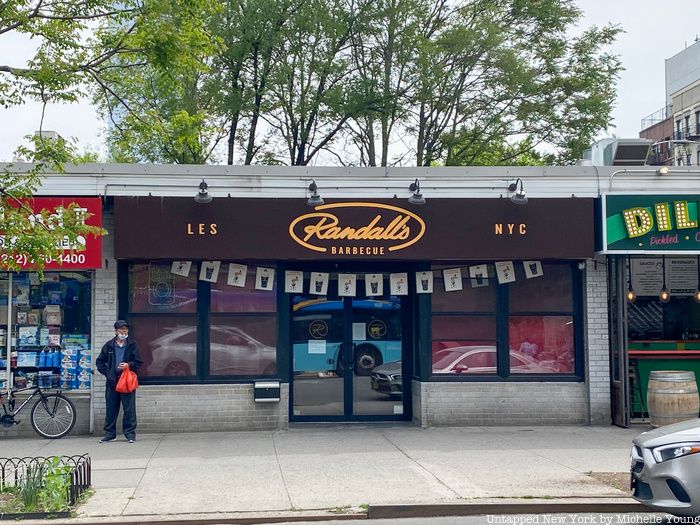
One of the youngest casualties on this list, the Lower East Side spot Randall’s Barbeque opened in 2018. On April 1st, 2020, the owner Jared Male posted a heartfelt goodbye on Instagram. Randall’s last meals were donated and delivered to the staff of Wyckoff Hospital hospital on April 3rd, with an Instagram photo and caption:
“We cooked our final meals here today and delivered it to the staff of Wyckoff Hospital in Brooklyn where they are showing up to work everyday, undeterred, to try and save lives. Thank you for doing what you do, and I hope the barbecue provided a brief moment of respite.”
22. La Caridad 78 (Opened 1968)
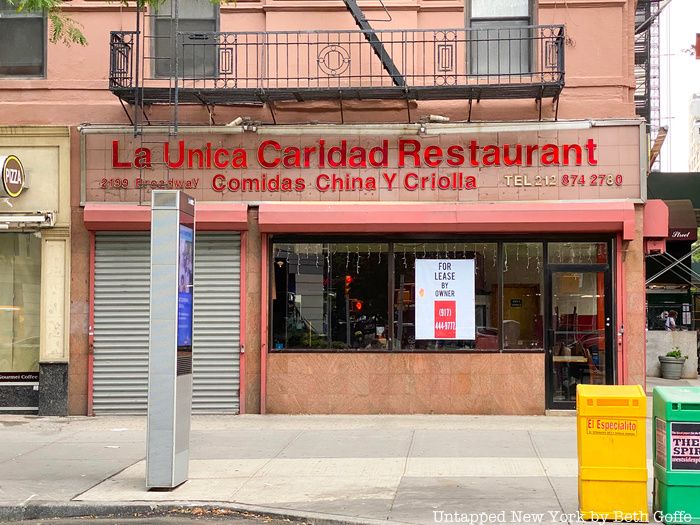
A “For Lease” sign in the window of La Caridad 78, a Cuban-Chinese staple on the Upper West Side, marks it as another closure of the COVID-19 pandemic. Upper West Side residents had earlier seen people remove furniture from the restaurant and claimed that the phone line was inaccessible. No explicit reason for the closure has been announced, but it joins dozens of other businesses that have permanently shuttered due to reduced revenue and restrictions on indoor dining.
La Caridad 78 was known for fusion dishes like a beef noodle soup with Cuban spices, Cuban-style roast pork with rice and yucca, and spare ribs in black bean sauce. Cuban-style rotisserie chicken and ropa vieja were often accompanied by spicy Cuban sauces, Chinese fried rice, and fried plantains. Dishes were colorful and vibrant, with exciting and bold flavors telling the story of a surprising combination of two rather different cultures.
23. Odessa Restaurant (Opened 1994)
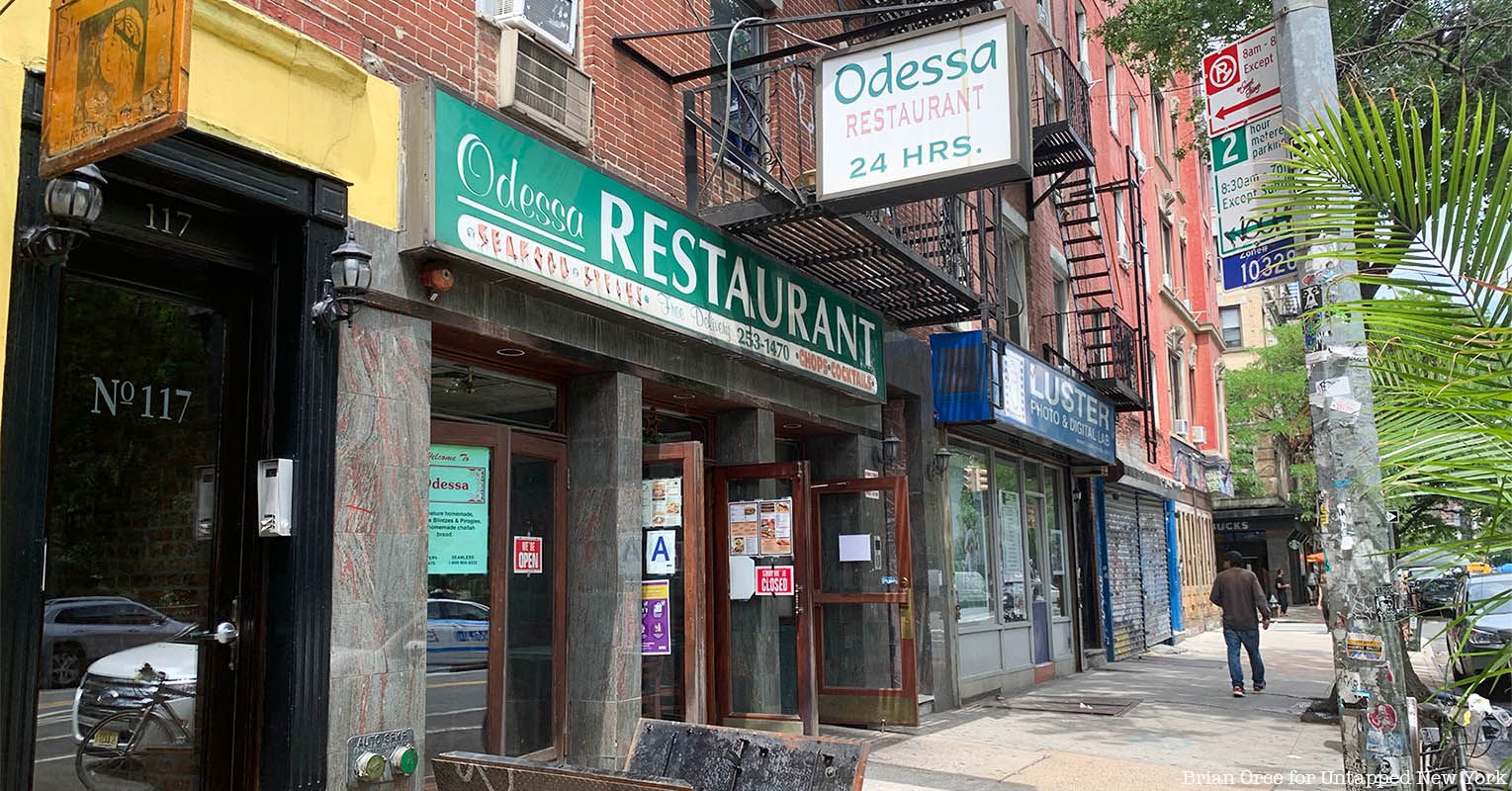
The famed Odessa Restaurant in the East Village will be closing its doors for good this Sunday, July 19th. Located at 119 Avenue A between Seventh Street and St. Mark’s Place, the Ukrainian eatery was a neighborhood staple and a favorite late night stop for partygoers. Its closure marks yet another business shutting its doors for good in the midst of the COVID-19 pandemic.
The restaurant opened in 1994, and much like Katz’s Deli, was known for its reasonable prices and huge portion sizes. The pierogis are a staple menu item, but other options include kasha varnishkes, blintzes and borscht, in addition to American breakfast staples.
24. Chumley’s (Originally opened 1922, most recently reopened 2016)
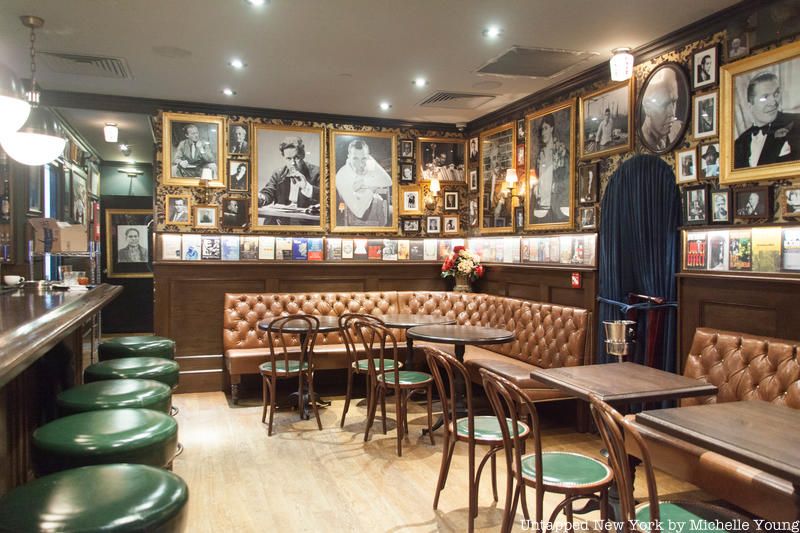
Another famed New York City establishment, Chumley’s, has seemingly shuttered. This historic bar and restaurant originally opened as a Greenwich Village speakeasy in 1922. The eatery was most recently renovated and re-opened in 2016. For the past few months, as noted on their website, Chumley’s had been temporarily closed to comply with orders that shut down New York City bars and restaurants. Yet as New York City’s lockdown lifts, Chumley’s doors may remain closed permanently.
Founder Leland Chumley, who considered himself a writer, attracted the likes of F. Scott Fitzgerald, Ernest Hemingway, and J.D. Salinger to his bar. Fitzgerald even had a favorite table, table 26.
Swanky leather booth benches, green bar stools, kitchen equipment, and literary memorabilia from inside Chumley’s were put up for auction with A. J. Wilner Auctions, but the auction was canceled Monday, July 29th. As of publication, representatives fro Chumley’s have not yet responded to our request for comment, and the future of the establishment remains unclear.
25. Gaia’s Italian Cafe (Opened 2011)
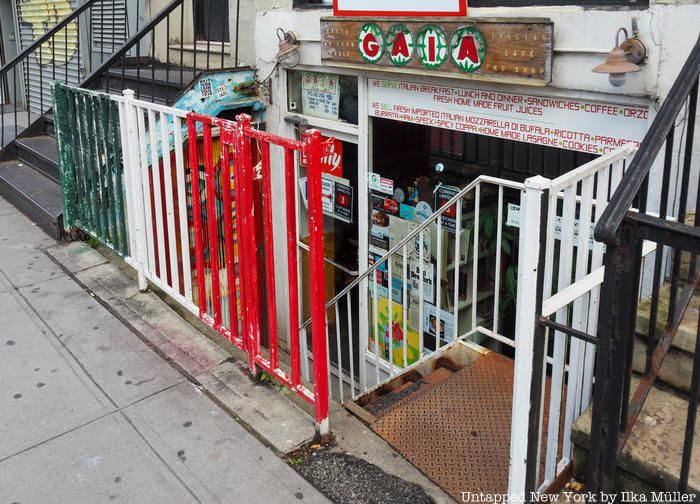
Italian eatery Gaia on the Lower East Side will be closing at the end of July, after the landlord decided not to renew the lease, which expires on July 31. The rather hidden East Houston Street restaurant was opened in January 2011 by owner Gaia Bagnasacco. Gaia is in the midst of searching for a new location after losing its lease, and for now, it was conducting takeout business until July 26th. A post on the restaurant’s Facebook page cited reasons for the restaurant’s closure as “end of the lease, eviction and to two year of harassment.”
Gaia is known for light fare like paninis, such as their Delizioso with prosciutto, mozzarella, and anchovies, or their Piccantino with salami and mascarpone. Tuesday through Saturday, Gaia offered daily pasta specials, such as pasta with a variety of seafood on Friday, and cannelloni on Saturday. Popular entrees included bresaola (dried and cured aged beef), caciotta cheese with truffle honey, and pesto lasagna.
“We want to celebrate earth,” Gaia writes on its menu. “We are guests on this earth, we do not possess it and we believe we need to learn and develop more respect for this planet.”
26. Abigael’s
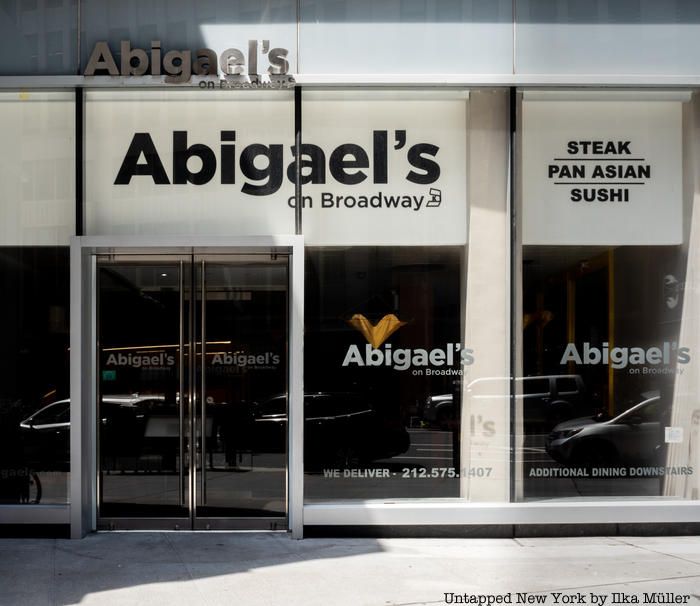
Broadway’s two-story fine dining restaurant Abigael’s, which featured a global Kosher menu, permanently closed in May. The eatery succumbed to COVID-19 and was one of the first eateries to close to protect staff and their families. According to Eater, Abigael’s will still be available for catering and from its concession stand at Madison Square Garden when it reopens.
Popular starters at Abigael’s included vegetable crudite with house-made chips, herb crusted salmon Nicoise, award-winning chili, and a number of sushi selections. Main courses ranged from blackened salmon to chicken dijon to herb-crusted sea bass, which were all above $33.
Chef Jeff Nathan wrote a heartfelt farewell post on Facebook: “For us at Abigael’s on Broadway, we stressed when the COVID 19 Pandemic hit New York City. We worried for the safety of our employees & their families. Therefore, we were one of the first restaurants that opted to close up shop for the duration of the outbreak, with big plans for opening again as soon as possible. Unfortunately, COVID 19 has taken a toll on the restaurant industry, too. Sadly, we have made the difficult decision to not re-open Abigael’s as a dine-in restaurant. For nearly 25 years we have been one of the original fine dining kosher restaurants in NYC. This was the final year on our lease and our partner of 35 years is ready to retire. With all these lost months, it is no longer practical for us to continue with the grand plans we had.”
Additional reporting by Kelly Glisson and Nicole Saraniero

